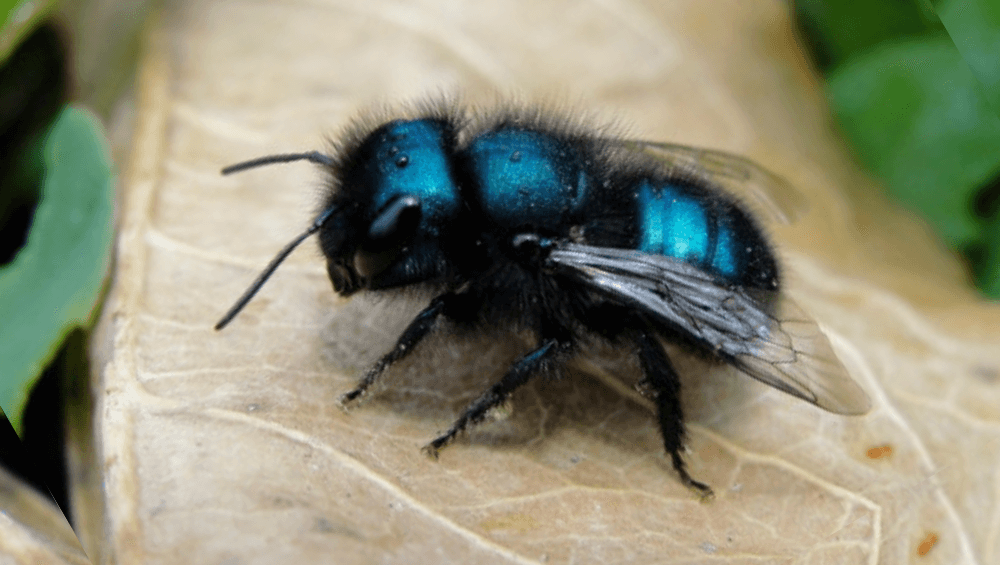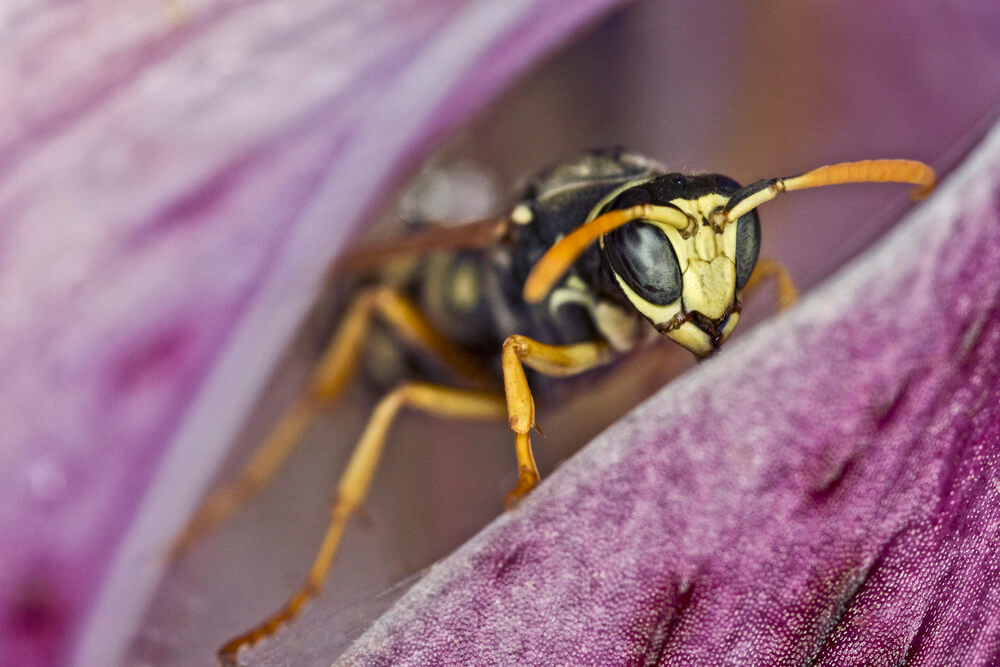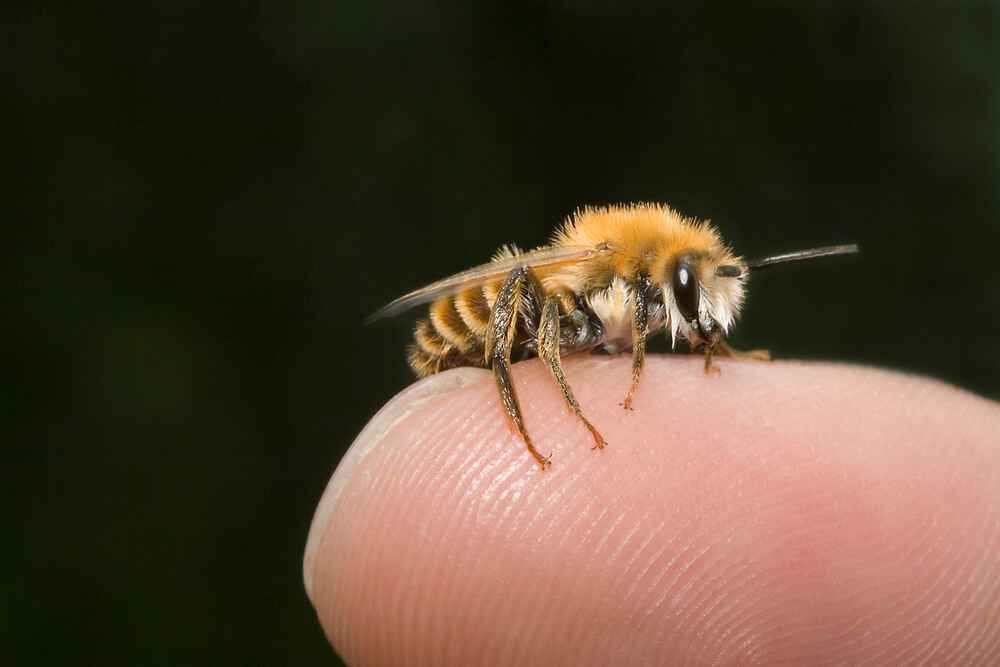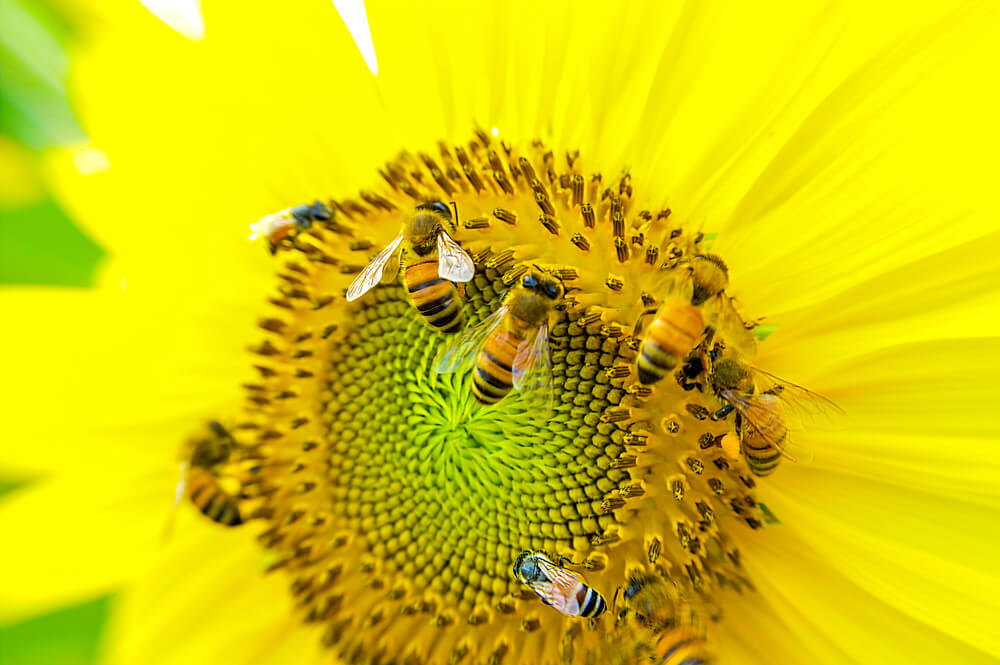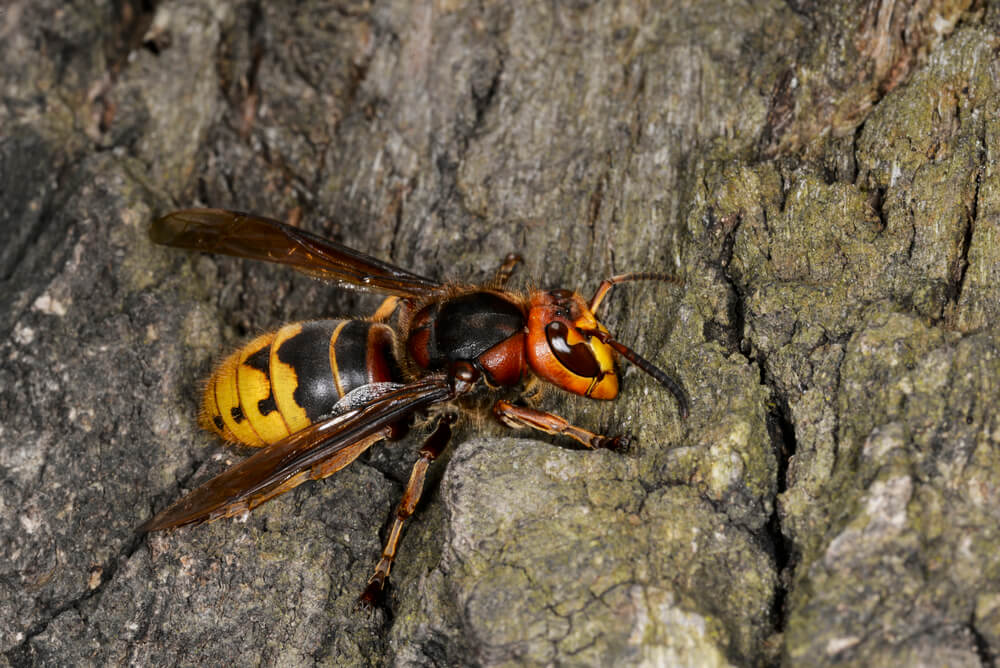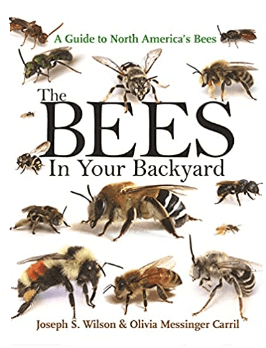Table of Contents:
What Are Blue Orchard Bees?
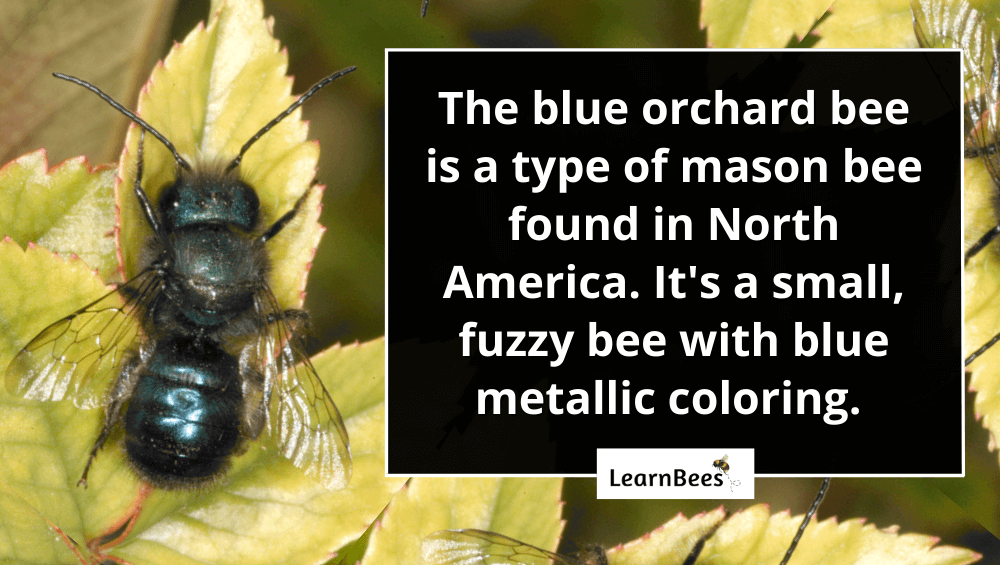
The blue orchard bee is a type of mason bee found in the United States and Canada.
And here’s the thing:
Blue orchard bees get their name from their dark metallic blue coloring. They’re also known to be very good at pollinating fruit trees, so that’s why they’re also called orchard bees.
More specifically?
It only takes about 400 blue orchard bees to do the pollination work of 40,000 honeybees. For instance, a honeybee typically has to visit a flower 7-10 times before it’s completely pollinated.(1)
But blue orchard bees?
They can pollinate a blossom in a single visit.
This is because blue orchard bees have fuzzy bodies that get coated in pollen. As such, they spread pollen around generously as they move from plant to plant. This is also why farmers love having blue orchard bees around to pollinate their fruit trees.
The hardworking bees work well beside honeybees in pollinating crops like blueberries, almonds, cherries, raspberries, and pears.
Blue orchard bees are small, gentle bees that belong to the Osmia genus. There are about 140 species of mason bees found in North America alone.
Can Blue Orchard Bees Sting?
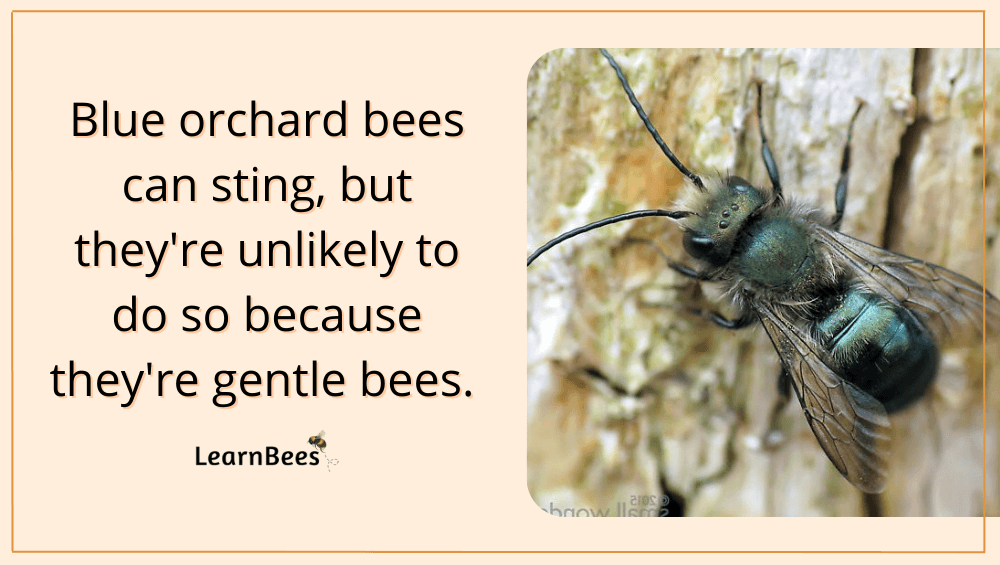
Yes, blue orchard bees can sting.
But is it likely?
Not really.
Remember that blue orchard bees live alone as solitary bees. They don’t produce honey nor live in social colonies. Because of this, blue orchard bees don’t have much to be territorial over.
Contrast that to honeybees.
Honeybees are social bees that live in family units with thousands of other honeybees.
A healthy honeybee colony can produce up to 100 pounds of honey per year. As such, honeybees are a huge target for predators who want to eat them or their honey. Examples include honey badgers, bears, skunks, and even other insects.
The same isn’t true for blue orchard bees.
Sure, blue orchard bees have to contend with predators like any bee. However, they aren’t responsible for protecting a hive or honey.
And as a result?
These bees are gentle insects that don’t sting for no reason. They’re beneficial to have in the garden.
And here’s the important part:
Only female blue orchard bees can sting. Male bees cannot. This is because stingers are modified egg-laying organs, so only female blue orchard bees have them.
This also applies to all bee species, including honeybees, sweat bees, and carpenter bees.
Are Blue Orchard Bees Beneficial?
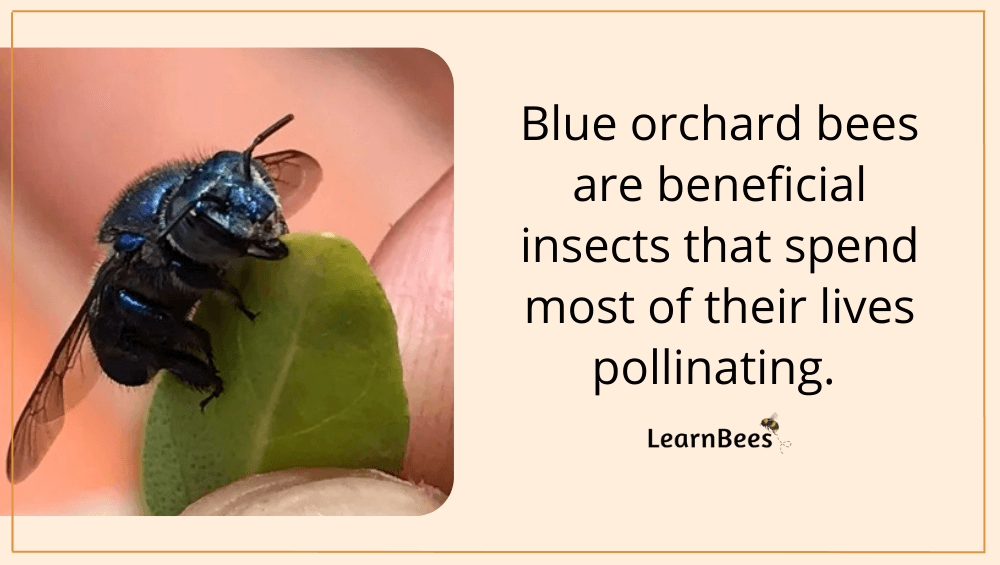
Yes, blue orchard bees are beneficial.
For starters, they’re vital pollinators who spend most of their life collecting pollen and nectar from plants. When a blue orchard bee flies on a blossom, its fuzzy body collects the pollen from the flower.
As the bee moves between plants, it leaves a few pollen grains behind each time.
This is known as cross-pollination, and many types of plants rely on this pollen transfer to produce seeds.
Better yet?
Both bees and plants benefit from cross-pollination.
Why?
Because a bee’s primary diet is pollen and nectar from blossoms. Nectar gives them the carbohydrates they need, while pollen gives them the protein they need.
Plants make nectar as bait to encourage bees to pollinate them. The plant produces seeds after being pollinated by the bee.
FAQs on Blue Orchard Bees
- How do you handle the blue orchard bee?
- How do you attract blue orchard bees?
- How long do blue orchard bees live?
- Can blue orchard bees buzz pollinate?
- Are blue orchard bees poisonous?
- Why are orchard mason bees blue?
- Where do blue orchard bees live?
- What do blue orchard bees eat?
- Are blue orchard bees rare?
- How do I get rid of blue orchard bees?
- Do blue orchard bees make honey?
- Are blue orchard bees aggressive?
- Are blue orchard bees solitary or social?
- Where do blue orchard bees go in the winter?
- Are blue orchard bees actually wasps?
- Are blue orchard bees actually hornets?
- Are blue orchard bees dangerous?
- Can blue orchard bees sting multiple times?
How do you handle the blue orchard bee?
You can provide blue orchard bees with a bee house, plenty of flowers, and a mud source to build their nests. Remember that blue orchard bees are a type of mason bee. To attract mason bees to your garden, click here.
Additionally, if you want to manage blue orchard bees for pollination, watch this video:
Other than that, you don’t need to handle mason bees. You simply leave them alone and allow them to do their pollination work.
—> Go back to the FAQs on blue orchard bees
More to Explore:
How do you attract blue orchard bees?
The best way to attract blue orchard bees is to provide a mud source for them to build their nests while also providing plenty of plants that produce nectar and pollen.
Remember that bees rely on flowers for both nectar and pollen. They consume both nectar and pollen for energy, protein, and carbohydrates. Nectar is a sugary liquid produced by flowers. Pollen is a yellow powdery substance made by seed plants.
But here’s the thing:
You might have a good mud source nearby for the blue orchard bees to nest with. But you also may not.
Blue orchard bees prefer clay-rich mud, not just wet clay or dirt. They also need the mud source within 50 feet of their nesting site. That said, you may have the right mud located nearby.
But if not?
You can buy mason bee mud mix online. It has the proper dough-like texture that the blue orchard bee is searching for.
From there, you’ll dig a small hole in the dirt and put the mud in it. The groundwater in your soil will aid in keeping the mud mixture at the proper moisture level. Don’t place the mud in a bowl or pot because it can get the mud too wet or too dry.
—> Go back to the FAQs on blue orchard bees
More to Explore:
- Do Carpenter Bees Pollinate?
- How Long Do Bumble Bees Live?
- Honeybees vs. Bumblebees: How Do They Compare?
How long do blue orchard bees live?
After emerging in the spring, blue orchard bees live between four to six weeks.
This seems like a short timeframe, but it’s a standard range for many other types of bees. For example, worker honeybees born in the spring and summer only live about six weeks.
But here’s the thing:
Although blue orchard bees have a shorter lifespan, they are more efficient pollinators than honeybees. In fact, a few hundred blue orchard bees can pollinate as many flowers as thousands of honeybees.
—> Go back to the FAQs on blue orchard bees
More to Explore:
Can blue orchard bees buzz pollinate?
We’ve found no evidence to suggest that blue orchard bees buzz pollinate.
That said, just because a bee can’t buzz pollinate doesn’t mean it isn’t beneficial to plants.
Blue orchard bees are excellent pollinators of fruits such as cherry, almond, and blueberry. This is why farmers are increasingly turning to blue orchard bees for fruit tree pollination.
—> Go back to the FAQs on blue orchard bees
More to Explore:
- Ground Bees: Are They a Threat to Your Yard?
- Wasps vs. Honeybees: Are They Different?
- Do Bumble Bees Bite?
Are blue orchard bees poisonous?
No, blue orchard bees are not poisonous at all.
—> Go back to the FAQs on blue orchard bees
More to Explore:
Why are orchard mason bees blue?
Simply put, that’s just the color that nature intended for them to be.
—> Go back to the FAQs on blue orchard bees
More to Explore:
Where do blue orchard bees live?
The blue orchard bee is native to North America, particularly the United States and Canada.
—> Go back to the FAQs on blue orchard bees
More to Explore:
What do blue orchard bees eat?
Like other types of bees, blue orchard bees eat pollen and nectar from blossoms. Pollen and nectar are available during the spring, summer, and fall when flowers are blooming.
During the winter, flowers become scarce, so pollen and nectar aren’t as readily available. This is why bees aren’t active during the winter months.
Pollen is a substance that helps bees grow and develop. It’s rich in protein. Nectar provides a carbohydrate-rich diet that gives bees energy.
Bees are vegetarian since they do not eat other insects. They only get their food from plants.
—> Go back to the FAQs on blue orchard bees
More to Explore:
Are blue orchard bees rare?
They’re certainly not as common as honeybees, but they aren’t necessarily considered rare.
Blue orchard bees are small, passive-natured bees that belong to the Osmia genus.
—> Go back to the FAQs on blue orchard bees
More to Explore:
How do I get rid of blue orchard bees?
You should not try to get rid of blue orchard bees.
As we’ve already established, they’re excellent pollinators. They are vital to the health of our ecosystem and the food supply.
If you have blue orchard bees on your property, it’s best to leave them be. They will pollinate your garden and pose very little threat to humans or pets. These bees aren’t aggressive.
—> Go back to the FAQs on blue orchard bees
More to Explore:
Do blue orchard bees make honey?
No, blue orchard bees don’t produce honey.
Despite popular belief:
Most species of bees don’t make honey. Honeybees and bumblebees are two common exceptions because they both produce honey.
With this in mind, honeybees are the only species of bee that produces enough honey for human consumption. Bumblebees only have small amounts of honey, which isn’t enough to harvest.
So all the raw honey you see at the store is made by honeybees.
—> Go back to the FAQs on blue orchard bees
More to Explore:
Are blue orchard bees aggressive?
No, blue orchard bees are not aggressive at all. In fact, the opposite is true. These bees are gentle and passive-natured.
Why?
Because they don’t make honey or live in social colonies. This means they aren’t territorial because they don’t have a hive or precious honey to defend.
Remember that blue orchard bees are a type of mason bee. These bees nest in empty holes made by other insects or birds. Sometimes they’ll even nest in man-made crevices or holes.
So unlike carpenter bees, blue orchard bees don’t drill into wood themselves.
The bottom line?
Unless you try to grab the blue orchard bee or stick your finger in its nesting hole, you shouldn’t have any problems.
—> Go back to the FAQs on blue orchard bees
More to Explore:
Are blue orchard bees solitary or social?
Blue orchard bees are solitary, meaning they live alone and not in social colonies like bumblebees or honeybees.
Instead, each female blue orchard bee creates her own nest.
You might see multiple blue orchard bees flying around your yard during the spring and summer. But they’re not working together. Instead, each bee is preoccupied with gathering food or mud for her own nest.
The spring and summer months are peak months for bees. This is because bees are cold-blooded creatures that don’t do well in cold, harsh climates.
You’re more likely to see blue orchard bees during the daytime because that’s when they’re up and about. They go back to their nests to rest at night.
—> Go back to the FAQs on blue orchard bees
More to Explore:
Where do blue orchard bees go in the winter?
Blue orchard bees usually overwinter as pupae or larvae in the nest that the adult blue orchard bee created for them. Once the spring arrives, and temperatures rise, they’ll hatch as adults.
Blue orchard bees only live about four to six weeks during the warmer months.
—> Go back to the FAQs on blue orchard bees
More to Explore:
Are blue orchard bees actually wasps?
No, blue orchard bees and wasps are two completely different insect species.
However, they can sometimes be confused with each other because they may have similar physical traits. Some types of wasps are metallic blue.
That said, there are more than 30,000 species of wasps, and 20,000 species of bees, so they’re both large groups full of diverse insects.
—> Go back to the FAQs on blue orchard bees
More to Explore:
Are blue orchard bees actually hornets?
No, hornets and blue orchard bees are two separate species. Hornets actually fall under the category of wasps, while bees are a separate category altogether.
Sometimes hornets might be mistaken for bees. However, hornets are larger with little to no fuzz on their bodies.
—> Go back to the FAQs on blue orchard bees
More to Explore:
Are blue orchard bees dangerous?
Blue orchard bees are not dangerous at all.
They aren’t aggressive, defensive, or territorial. This is because they don’t make honey or live in hives with other bees. These bees live alone and don’t have honey to protect.
The only time you might be cautious around blue orchard bees is if you’re allergic to bee stings. Bee stings can result in an allergic reaction in certain people. So if you’re allergic to bee stings, it’s best to give distance to all bee species – not just blue orchard bees.
But in most cases, you don’t have to worry about blue orchard bees around humans or pets.
—> Go back to the FAQs on blue orchard bees
More to Explore:
Can blue orchard bees sting multiple times?
Curious minds often ask, “Do blue orchard bees sting?”
Yes, blue bees can sting several times. However, this is extremely rare because blue orchard bees are gentle. So unless you’re threatening them or their nest, you don’t have to fear getting stung by them because it’s unlikely.
And fortunately, in the rare case that you do get stung, it’s not as painful as you might think.
